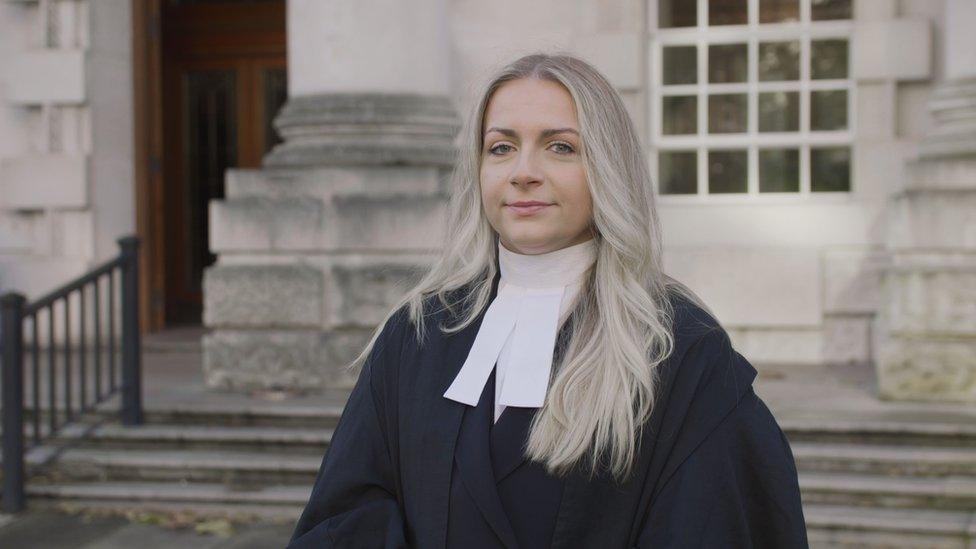Legal aid: Lawyer strike disrupts NI courts
- Published

Aoife Marken, Thomas Thibodeau and Taryn Graham are among the criminal barristers on strike over delays in their payments
Lawyers in Northern Ireland are taking part in a one-day strike over delays in legal aid payments which are taking up to six months.
The action is disrupting courts and comes despite an attempt by the Department of Justice (DoJ) to avert action.
It has announced an £11m package to improve payment times over the next few months.
But barristers dismissed it as "a temporary sticking plaster".
The strike follows a ballot by the Criminal Bar Association (CBA) and involved more than 200 barristers.
It said the "intolerable" late payment of fees is made worse by legal aid rates having been eroded significantly by inflation since 2005.

Criminal barrister Taryn Graham says young, female lawyers like her are being hit hard
Taryn Graham is one of the criminal barristers on strike.
"As independent, self-employed practitioners these payment delays place us in a wholly unprecedented position," she said.
"The financial challenges being faced are hitting younger and female lawyers the hardest.
"Today's initial strike action has not been taken lightly. It is a regrettable but necessary measure to preserve the viability of legal aid as a vital demand-led public service that embodies the core of access to justice."
On Thursday, solicitors said they would join the walk-out.
The Solicitors Criminal Bar Association (SCBA), which represents more than 100 firms, said the delays "cannot be allowed to continue".
It pointed out that cases can also take years to conclude before payment can be requested. Sums involved can run into several thousands.
Talks between the CBA and DoJ have been taking place over the issue.
'Premature action'
On the eve of the strike, the DoJ revealed that an additional £11m has been found for this financial year.
Permanent Secretary Richard Pengelly said: "This money will greatly assist in improving payment times to the end of the current financial year.
"Given this additional funding and the ongoing engagement, the action being taken by the Bar is premature.
"I am sympathetic to the frustration of the profession," Mr Pengelly continued.

Richard Pengelly warned the strike would impact those who need legal representation
"It is no secret that the current budget provision is insufficient.
"However, this action risks adversely impacting those who need legal representation at a time when the department cannot resolve the matter."
The CBA described the move as "a partial, short-term measure".
In a statement, it added: "Although welcome, it serves only as a temporary sticking plaster.
"It does not achieve the necessary change in departmental policy and does not fix the structural problems associated with long overdue payments."
It said Friday's action meant criminal barristers would not attend any court, or do related work, "except for emergency matters".
Some court business will take place, according to the Lady Chief Justice's Office.
It said: "The judiciary had prior notice of the planned day of action.
"This provided an opportunity for judges to plan their courts accordingly and matters will be progressed where it is possible to do so."